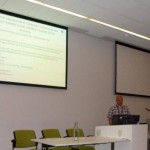 Mr Mayank Anand, a research student in BU’s School of Design, Engineering & Computing, recently attended the SET for Britain at the House of Commons in London. SET for Britain is an annual national research conference which is organized by The Parliamentary and Scientific Committee and aims at promoting early-stage and early-career research scientists, engineers and technologists of Britain.
Mr Mayank Anand, a research student in BU’s School of Design, Engineering & Computing, recently attended the SET for Britain at the House of Commons in London. SET for Britain is an annual national research conference which is organized by The Parliamentary and Scientific Committee and aims at promoting early-stage and early-career research scientists, engineers and technologists of Britain.
Mayank presented his research on Lubricant condition monitoring for the in-service lifeboats of the Royal National Lifeboat Institution (RNLI) which is supervised by Prof Mark Hadfield and Dr Ben Thomas from BU, Mr Steve Austen (Head of Engineering) from RNLI and in-kind supported by BP Technology Ltd. The project has also been kindly supported by the members of Sustainable Design Research Centre. Mayank’s abstract was chosen out of hundreds of leading research applications from around the UK to appear amongst the 60 finalists at the conference and drew a great deal of interest from MPs and other participants.
The MPs for the constituency of Bournemouth, Mr Tobias Ellwood (East Bournemouth) and Mr Conor Burns (Bournemouth West) kindly attended the conference to speak to Mayank about his research.
On presenting his engineering research to the MPs, Mayank said, “it was a unique experience speaking to the MPs about my project and to see their enthusiasm for research. They asked valuable questions and there was a great deal of discussion about the different aspects of the project. It also gave me an opportunity to learn that how an individual research at the university level can contribute to the overall research outputs of UK and helps the government while making research based decisions”. Mayank added “My work also received attention from the industry people in terms of how the approach I adopted in my research can be applied to other engineering applications. This was a real boost to my confidence as not only my work was appreciated but also considered to be useful extensively. Networking with the other researchers from universities across the UK was an added bonus to get to know about their research and share ideas in common research interests”.

 FHSS PhD student Jib Acharya presented at University of Chester
FHSS PhD student Jib Acharya presented at University of Chester










 Conversation article: Why so many people drown at the water’s edge
Conversation article: Why so many people drown at the water’s edge Workshop on longitudinal studies in three countries
Workshop on longitudinal studies in three countries New Bournemouth University public health paper
New Bournemouth University public health paper New ACORN-funded paper published. When time is short but passion for food is strong, food day-tripping may be the answer!
New ACORN-funded paper published. When time is short but passion for food is strong, food day-tripping may be the answer! Royal Society of Chemistry Outreach Fund: Open for Applications
Royal Society of Chemistry Outreach Fund: Open for Applications Last reminder – MSCA Postdoctoral Fellowships 2024 internal deadline next week
Last reminder – MSCA Postdoctoral Fellowships 2024 internal deadline next week Horizon Europe – EuroHPC and MSCA PF webinars
Horizon Europe – EuroHPC and MSCA PF webinars